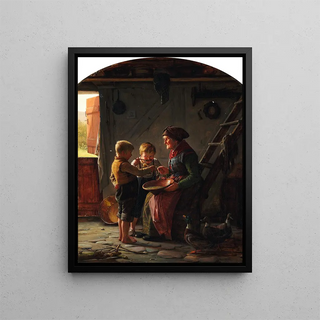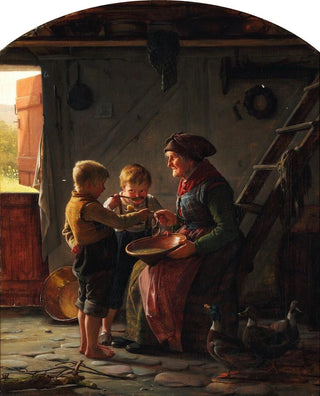Art print A meal - Carl Bloch | Art print


View from behind

Frame (optional)
In the world of art, some works transcend their era to become timeless witnesses to the human condition. "Un repas - Carl Bloch" is one of those creations that, through its emotional depth and narrative richness, captivates the viewer. This piece, depicting a moment of sharing and conviviality, invites reflection on human relationships and cultural traditions. Through this representation, Bloch manages to establish a dialogue between the past and the present, thus rendering his painting eternally relevant. The soft light bathing the scene, the expressions of the characters, all contribute to creating a warm and welcoming atmosphere, as if one were personally invited to this feast.
Style and uniqueness of the work
Carl Bloch's style is distinguished by its poignant realism and attention to detail. In "Un repas," every element, from faces to clothing, is rendered with precision that demonstrates his technical skill. The colors, both vivid and nuanced, give the scene a palpable vitality. The composition is carefully orchestrated, with each character occupying a significant place in the painting, reinforcing the sense of harmony and balance. Bloch also uses light masterfully, creating shadows and reflections that add depth to the scene. This play of light and shadow not only emphasizes the expressions of the characters but also highlights the importance of the moment depicted. Thus, "Un repas" does not merely depict a simple scene of life; it evokes universal emotions such as joy, solidarity, and sharing.
The artist and his influence
Carl Bloch, a Danish painter of the 19th century, is often regarded as one of the masters of Scandinavian realism. His career, marked by an interest in religious and historical themes, was influenced by the great masters of European painting. Bloch mastered these influences while developing a personal style that is uniquely his own. His work is characterized by an ability to capture the human essence in all its complexity. By tackling subjects related to spirituality and daily life, he managed to reach a broad audience and

Matte finish

View from behind

Frame (optional)
In the world of art, some works transcend their era to become timeless witnesses to the human condition. "Un repas - Carl Bloch" is one of those creations that, through its emotional depth and narrative richness, captivates the viewer. This piece, depicting a moment of sharing and conviviality, invites reflection on human relationships and cultural traditions. Through this representation, Bloch manages to establish a dialogue between the past and the present, thus rendering his painting eternally relevant. The soft light bathing the scene, the expressions of the characters, all contribute to creating a warm and welcoming atmosphere, as if one were personally invited to this feast.
Style and uniqueness of the work
Carl Bloch's style is distinguished by its poignant realism and attention to detail. In "Un repas," every element, from faces to clothing, is rendered with precision that demonstrates his technical skill. The colors, both vivid and nuanced, give the scene a palpable vitality. The composition is carefully orchestrated, with each character occupying a significant place in the painting, reinforcing the sense of harmony and balance. Bloch also uses light masterfully, creating shadows and reflections that add depth to the scene. This play of light and shadow not only emphasizes the expressions of the characters but also highlights the importance of the moment depicted. Thus, "Un repas" does not merely depict a simple scene of life; it evokes universal emotions such as joy, solidarity, and sharing.
The artist and his influence
Carl Bloch, a Danish painter of the 19th century, is often regarded as one of the masters of Scandinavian realism. His career, marked by an interest in religious and historical themes, was influenced by the great masters of European painting. Bloch mastered these influences while developing a personal style that is uniquely his own. His work is characterized by an ability to capture the human essence in all its complexity. By tackling subjects related to spirituality and daily life, he managed to reach a broad audience and
12,34 €






